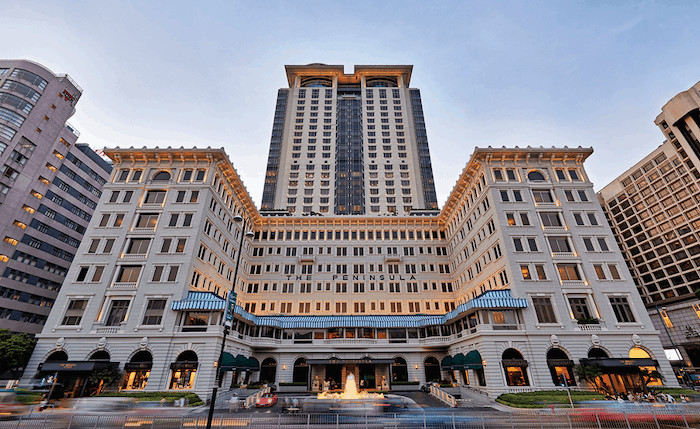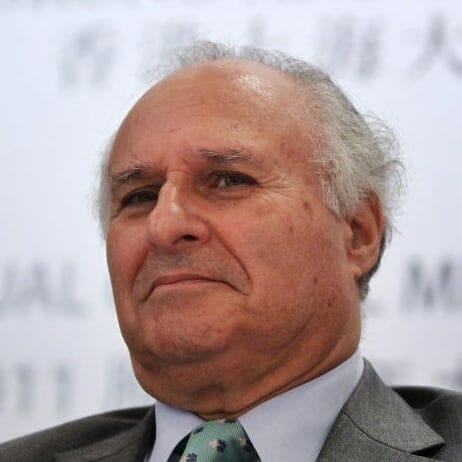
Hongkong and Shanghai Hotels’ Peninsula Hong Kong
Occupancy at Hong Kong’s famed Peninsula hotel plunged to 14 percent in the first three months of the year, as the owner of the 300-room luxury hotel – Hongkong and Shanghai Hotels – suffered from what chairman Sir Michael Kadoorie called the “devastating impact of the COVID-19 coronavirus around the world”.
Revenue per available room at the Kowloon landmark fell 85 percent to HK$616 ($79) in the first quarter of the year, compared with HK$4,164 during the same three months in 2019, according to unaudited operating statistics for this quarter which were released today.
Although Hong Kong was the 154-year-old company’s worst performing city, the owner and operator of ten Peninsula hotels around the world saw guests vanish from its rooms and revenues dry up across all geographies.
Asia Hotel Occupancy Falls to 36%
Occupancy at the company’s luxury hotels in Shanghai, Beijing, Tokyo, Bangkok and Manila fell to 36 percent, with revenue across their 1,500 rooms dropping 45 percent to HK$1,038.

Hongkong and Shanghai Hotels chairman Michael Kadoorie said the pandemic has devastated his hotels
In the US and Europe, where the group owns Peninsula hotels in New York, Chicago, Los Angeles and Paris, its 969 rooms were just over half full, down five percentage points to 52 percent from the same period the year before – pushing revenue per available room down 10 percent to HK$2,944.
Government measures to stop the spread of the virus have forced the company to shutter its hotels in New York, Chicago, Paris, Tokyo, Bangkok and Manila, with re-opening expected in June at the earliest, according to the company’s announcement.
“We are minimising cash spend as much as possible, and we believe our financial resources are currently sufficient to meet the group’s funding requirements for an extended period,” Kadoorie said in a statement.
The downbeat quarterly operating results come just under three months after the iconic hospitality firm warned investors that its underlying profit for the first half of 2020 will be “significantly lower than the figures for the same period last year”.
Daniel J Voellm, managing partner of HVS Asia Pacific, said that although Hongkong and Shanghai Hotels revenue per available room was down almost 37 percent globally, the company’s results are symptoms of a syndrome which is likely to show up in announcements from hospitality firms globally.
“Expectations for the industry are that in the second quarter performance will reflect the full impact of travel restrictions,” Voellm noted.
Hotel Crisis Far From Over
“Our priority at this time is to preserve jobs and protect the livelihoods of our staff as we work hard to contain costs as much as possible, and to ensure the safety of our guests in the properties which remain open,” Kadoorie said today.
The scion of the family which first opened Hong Kong’s Peninsula Hotel in 1928 highlighted that Hongkong and Shanghai Hotels had come into the crisis with low gearing and high liquidity – with the company’s net external debt to total assets standing at 13 percent as of 31 December 2019.
“This is an extremely low gearing for any firm with extensive real estate holdings and should give sufficient room to manoeuvre as the need for future funding arises,” HVS’ Voellm said.
With the Kadoorie family having a controlling interest of almost 60 percent in the company, Voellm said that it is “fairly safe to expect that any need for short-term funding that is not covered by debt should be possible to be covered by its shareholders”.
The company has HK$6.9 billion available in undrawn loans, according to today’s announcement.
Would like to see the full view of the hospitality in Asia Pacific and critics report of Covid19. What is the expectation the tourist will start travelling? How and who will boost their confidence for travelling? Are you expecting the inclined curve will start from Sept onward slowly.
I would be happy to spend my weekends in their fine hotel in Hong Kong but the prices are still in cloud cuckoo land. The could offer a stripped down staycation package and claw some revenue streams back. The upward only pricing algorithm has to go.
At the same time, the funding crisis of these organisations is only as big as the profits that have been taken by the owners in the good years. They could stick that money back in and save their business if they wanted to.